RIYADH: The G20 Coral Research and Development Accelerator Platform, CORDAP, was hosted in Riyadh on Monday to celebrate Saudi Arabia’s prominent role in global coral conservation.
During the event, officials launched the CORDAP Foundation, which had been established by a royal order.
According to a report, 1 billion people rely on coral reefs for food, income, medicine and coastal protection, but more than two-thirds of coral reef coverage globally has already been lost. To address this urgent issue, G20 CORDAP was set up to accelerate research and innovation.
Princess Reema bint Bandar, the Saudi ambassador to the US, took part in a panel discussion titled “The Emergence of Saudi Leadership in Environmental Conservation: Protecting Coral Reefs.”
She said: “I think nations are beginning to realize that the next crisis is going to be the crisis of water and resources. So, if we don’t take that time right now to align, to share the resources, but share the burden to fix what we have done, I think we forget that we didn’t inherit what we have from our ancestors, we’re borrowing from our future generations.”
Fahad bin Abdullah Toonsi, secretary-general of the Saudi G20 Secretariat and adviser to the Royal Court, shared insights on the journey of the Saudi government’s proposal and its acceptance by G20 leaders during the Saudi G20 presidency in 2020, ultimately resulting in the establishment of CORDAP.
Saudi Deputy Minister of Environment, Water and Agriculture Osama Faqeeha said: “The Royal Court’s approval of the CORDAP Foundation marks a major milestone toward implementing this distinguished global initiative.
“The nonprofit organization will facilitate the receipt of financial contributions to CORDAP from G20 and non-G20 countries, the private sector and other contributors according to CORDAP’s charter endorsed by G20 environmental ministers,” he added.
Carlos M. Duarte, executive director of CORDAP and professor at KAUST said: “The future of our oceans depends on us taking action now.”
He added: “70-90 percent of the remaining coral reefs could disappear in the next 10-15 years, a projection that is exemplified by the catastrophic coral losses ongoing in the Caribbean affected by an unprecedented marine heat wave. An ocean without healthy corals is unthinkable.
“Accelerating the next generation of science and technology to help conserve and restore corals, while no efforts are spared to mitigate the pressures on them, must be a priority.”
Duarte told Arab News that G20 nations were among those at risk of losing coral reefs, and that no single nation had the capacity to solve the problem alone.
“60 percent of the world’s coral reefs are under the care of the G20 countries. Therefore, they made the decision to establish a chord under the direction of this Saudi presidency. I was therefore appointed during the Leaders’ Summit in 2020. We are now one of the three pillars of the worldwide conservation effort for coral reefs after two years.”
“It is a huge recognition of the leading role of Saudi Arabia as a leader in a global environment, not just in our own territory.”
Tony Chan, president of KAUST, highlighted the university’s support for CORDAP and Saudi Arabia’s leadership for coral conservation and research.
Many Saudi entities signed MoUs to support the foundation’s efforts in saving reefs, recognizing Saudi Arabia’s leading role in the fight.
CORDAP, headquartered at KAUST in Thuwal, Saudi Arabia, is the first international operating foundation incorporated by the Kingdom. Its establishment paves the way for future foundations to contribute to global goals and support the Saudi leadership in addressing global challenges.
The successful G20 presidency of Saudi Arabia identified coral reefs as key components of the ocean ecosystem at risk, and launched a collaborative Coral Research and Development Accelerator Platform, established by G20 nations in 2021, to drive a global effort to deliver the science and technology required to save tropical and cold-water corals.
Saudi Arabia ‘playing leading role’ in fight to save coral reefs
https://arab.news/6ydvf
Saudi Arabia ‘playing leading role’ in fight to save coral reefs

- New foundation launched to accelerate research and innovation
- Carlos M. Duarte, executive director of CORDAP and professor at KAUST said: “The future of our oceans depends on us taking action now”
Saudi Arabia welcomes Oman’s hosting of Iran-US talks, says dialogue is the way to go

- Kingdom says it prefers dialogue as a way to end all regional and international disputes
- American and Iranian delegations met for the first time in Muscat, Oman, to lay down the format of their talks
RIYADH: Saudi Arabia welcomed Oman's hosting of the Iran-US talks on Tehran's nuclear program, the Ministry of Foreign Affairs has said, adding that the Kingdom prefers dialogue as a way to end all regional and international disputes.
In a statement carried by the Saudi Press Agency, the ministry said Saudi Arabia hopes that the talks "will lead to supporting joint action to enhance security, stability and peace in the region and the world."
On April 12, American and Iranian negotiators met for the first time in Muscat, the Omani capital, as the long-term adversaries try to come up with a new nuclear deal in place of the failed 2015 accord.
The 2015 accord, or the Joint Comprehensive Plan of Action (JCPOA), was a long-term deal that Iran agreed with world powers known as the P5+1 - composed of the US, UK, France, China, Russia and Germany.
Under that agreement, Iran was to limit its nuclear activities and allow international inspectors to visit its nuclear sites. In return, economic sanctions on Iran would be lifted by the world powers, notably the US.
Donald Trump, however, pulled the US out of the agreement in his first term of office in 2018 amid objections by other regional powers that the accord lacked the teeth to curtail Iran's nuclear activities and only empowered Tehran to continue interfering in the affairs of its neighbors.
In his second terms as president, Trump invited Iran's leadership to the negotiating table to avoid military action.
In Saturday's initial meeting in Muscat, Oman's Foreign Minister Badr Albusaidi acted as intermediary, shuttling from one room to the other where the American and Iranian delegations were assigned, as the long-time adversaries tried to lay the groundwork for their high-stakes nuclear talks.
Albusaidi later told reporters that the talks took place in a “friendly atmosphere,” adding: “We will continue to work together.”
According to the Iranian foreign ministry, the negotiators also spoke directly for “a few minutes,” and that the talks were held “in a constructive and mutually respectful atmosphere.”
Steve Witkoff, a real estate magnate, headed the US team, while Iran's team was led by Foreign Minister Abbas Araghchi, a seasoned diplomat and key architect of the 2015 accord.
Just before the first meeting started, Trump told reporters: “I want Iran to be a wonderful, great, happy country. But they can’t have a nuclear weapon.”
Supreme leader Ayatollah Ali Khamenei’s adviser Ali Shamkhani said Iran was “seeking a real and fair agreement.”
The two sides have agreed to meet again.
Misk Foundation, London Business School sign strategic agreement

- The agreement aims to explore collaboration in areas such as leadership development, executive education, scientific research, and strategic communication
RIYADH: The Mohammed bin Salman Foundation, also known as Misk, and London Business School signed on Sunday a strategic agreement to strengthen leadership and advance executive education.
The agreement aims to explore collaboration in areas such as leadership development, executive education, scientific research, and strategic communication, in line with Saudi Vision 2030’s goals to empower leadership across the public, private, and nonprofit sectors.
It was signed by Dr. Badr Al-Badr, CEO of the foundation, and Professor Sergei Guriev, Dean of London Business School, in the presence of Majid Al-Qasabi, Vice Chairman of Misk Foundation, and Yousef bin Abdullah Al-Benyan, Minister of Education.
The cooperation includes designing and delivering empowerment and leadership development programs for youth, and developing short executive courses and tailored workshops for Saudi leaders.
It will study the potential establishment of a regional executive education hub in Mohammed bin Salman Nonprofit City.
Commenting on the partnership, Al-Badr said the agreement reflects Misk Foundation’s commitment to developing a generation of leaders capable of shaping a sustainable future and driving national transformation.
“Through the strategic collaboration, we aim to deliver effective educational and executive solutions, and to advance scientific research that support the development of qualified leadership capabilities, contributing to enhancing the Kingdom’s competitiveness regionally and globally,” he added.
This partnership with London Business School, one of the world’s most prestigious academic institutions, falls within Misk Foundation’s broader efforts to provide innovative learning and training opportunities that contribute to building a thriving society led by youth.
US energy secretary praises Saudi cooperation

- Chris Wright discussed renewable energy sources with Saudi officials
RIYADH: US Energy Secretary Chris Wright praised Saudi Arabia’s leadership for fostering robust energy cooperation between the two countries.
Wright, who visited the Kingdom on Sunday, expressed his gratitude to Crown Prince Mohammed bin Salman and Energy Minister Prince Abdulaziz bin Salman for supporting energy partnership with the US.
During a media briefing at the Energy Ministry in Riyadh, Wright discussed his conversations with Saudi officials regarding energy investment, trade and security. He praised the Kingdom’s solar energy sector and innovative energy development approach.
He discussed renewable energy sources such as green hydrogen and solar power with Saudi officials, stressing the need for long-term investments to meet rising global demand, the Saudi Press Agency reported.
Wright highlighted the importance of stable oil prices to encourage investments in vital minerals, and emphasized the need to promote mutual investment and consistent growth in energy supplies, the SPA added.
Regarding the tariffs introduced globally by the US, he said the focus was on fair trade and bringing jobs back to the country. Wright described them as strategic tariffs aimed at encouraging domestic investment.
Fashioning identity: Saudi designer champions tour guides as ambassadors

- Dallal Al-Juhani’s uniform concept weaves together tradition, technology
- We should showcase Saudi heritage to the world through tourism and fashion, she says
JEDDAH: In Saudi Arabia, where each region’s distinct heritage shines through its landscape and traditions, tour guides serve as vital ambassadors — and one Saudi designer believes their attire is key to embodying the cultural treasures they represent.
Dallal Al-Juhani, a fashion design faculty member at Taibah University, has developed a visionary concept for tour guide uniforms in AlUla which blends heritage with modern style.
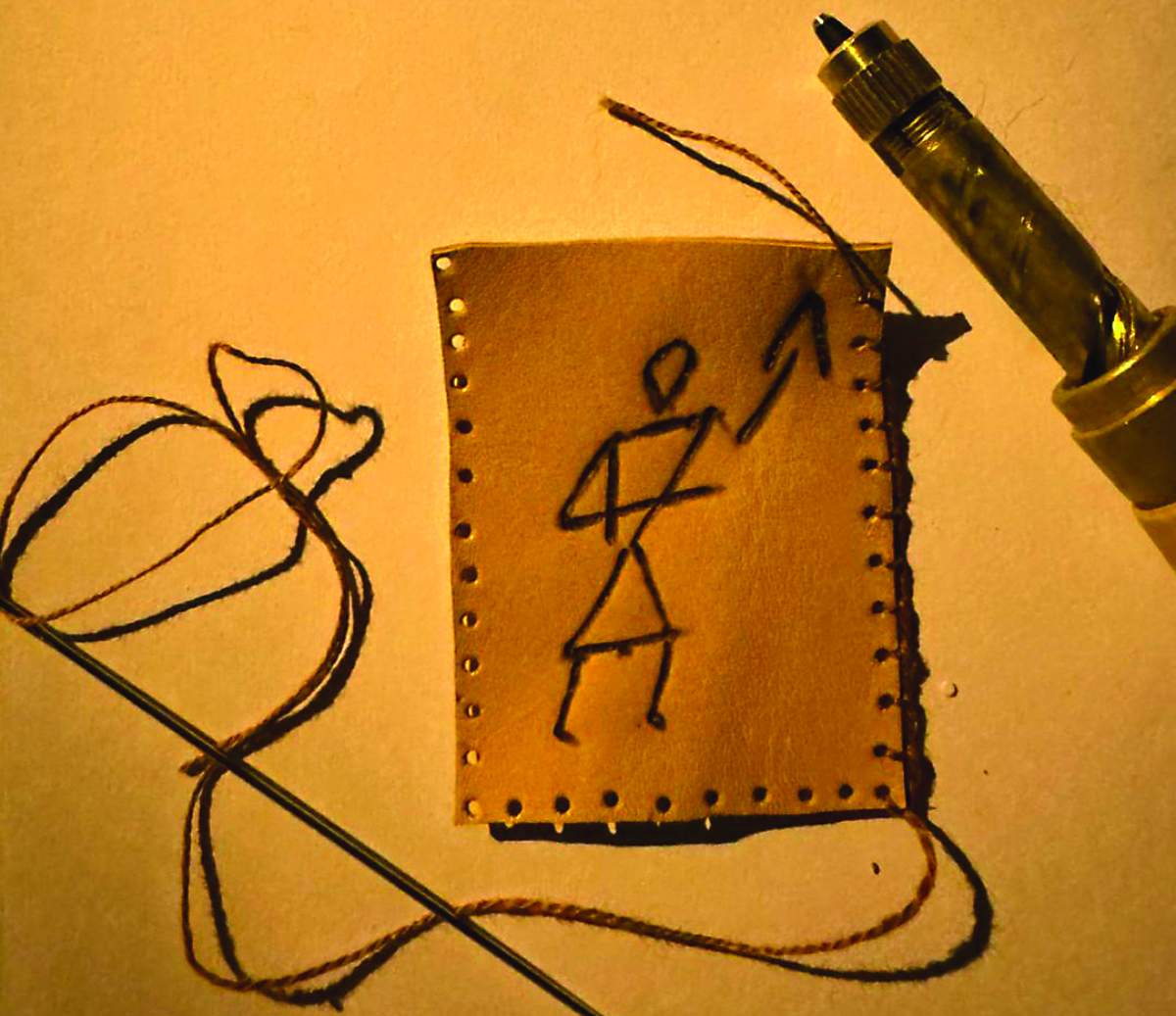
Using technology to champion heritage, her project merges the cultural identity of AlUla with aesthetics and the functional needs of the job, highlighting Saudi identity in its finest form.
“Saudi heritage has its place and value,” she told Arab News. “We should be proud of it and showcase it to the world through the tourism and fashion sectors."
HIGHLIGHT
Dallal Al-Juhani, a fashion design faculty member at Taibah University, has developed a visionary concept for tour guide uniforms in AlUla which blends heritage with modern style.
Al-Juhani holds a bachelor’s degree in clothing and jewelry design from Taibah University, and boasts a master’s in fashion design from King Abdulaziz University.
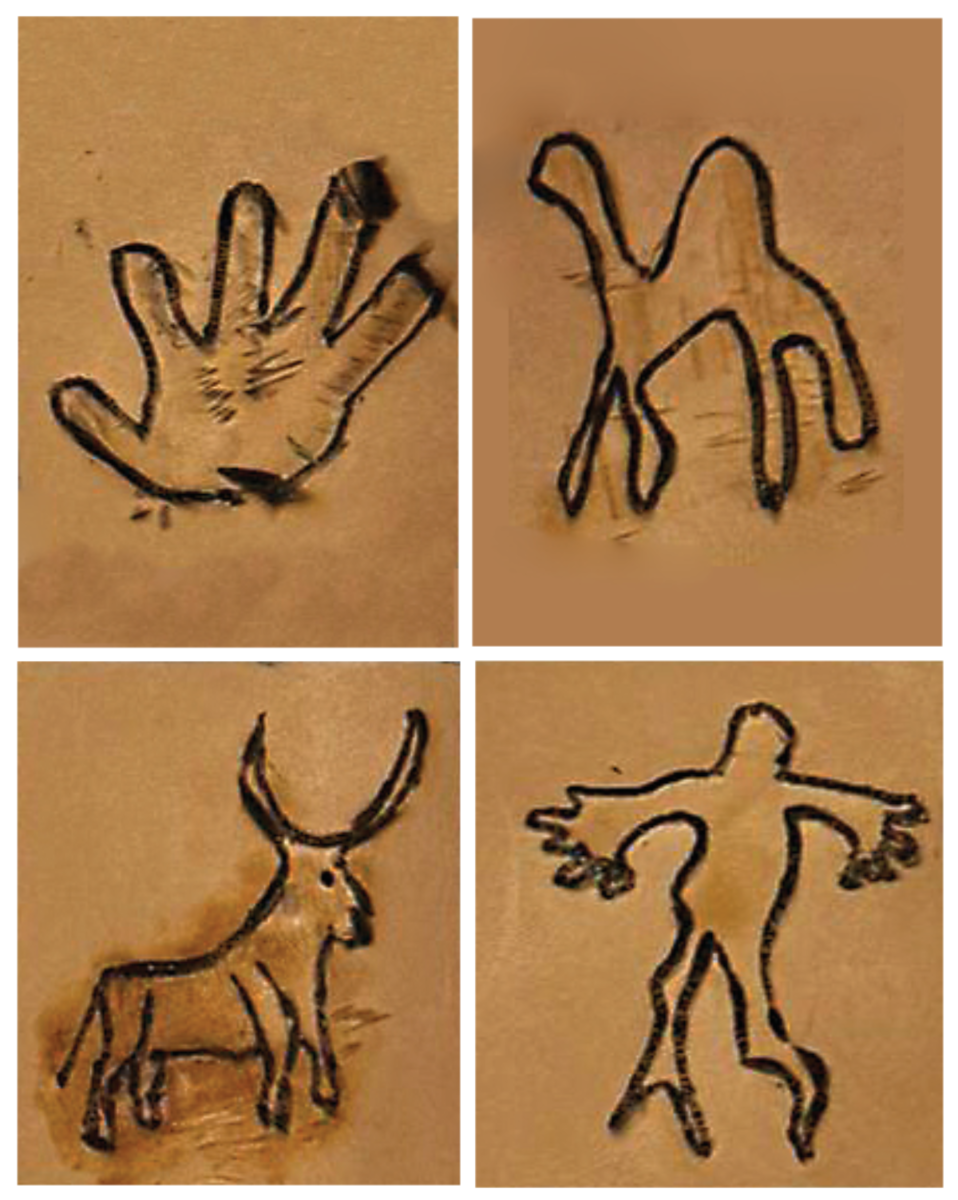
She added: “During my studies there was a significant focus on fashion that reflects heritage, as well as the role of modern technologies in the development of the fashion industry.”
Reflecting on the inspiration behind her vision for tour guide uniforms, she said: “During my visit to AlUla in 2021 I noticed that tour guides did not have a specific uniform to stand out to visitors.
Saudi heritage has its place and value. We should be proud of it and showcase it to the world through the tourism and fashion sectors.
Dallal Al-Juhani, Saudi designer and academic
“As a fashion designer I felt compelled to find a solution to this issue by creating designs suitable for this role.”
Al-Juhani’s uniform concept reflects the rich identity of AlUla through colors, patterns, materials, and techniques, all inspired by the region’s heritage.

It serves as a visual narrative, representing the beauty of AlUla’s monuments while establishing a deep connection between the storyteller and the place itself.
She said: “Patterns were inspired from iconic locations such as Al-Hijr and Jabal Ikmah, incorporating Nabataean letters and prominent symbols such as the bull, lion, and hand.”
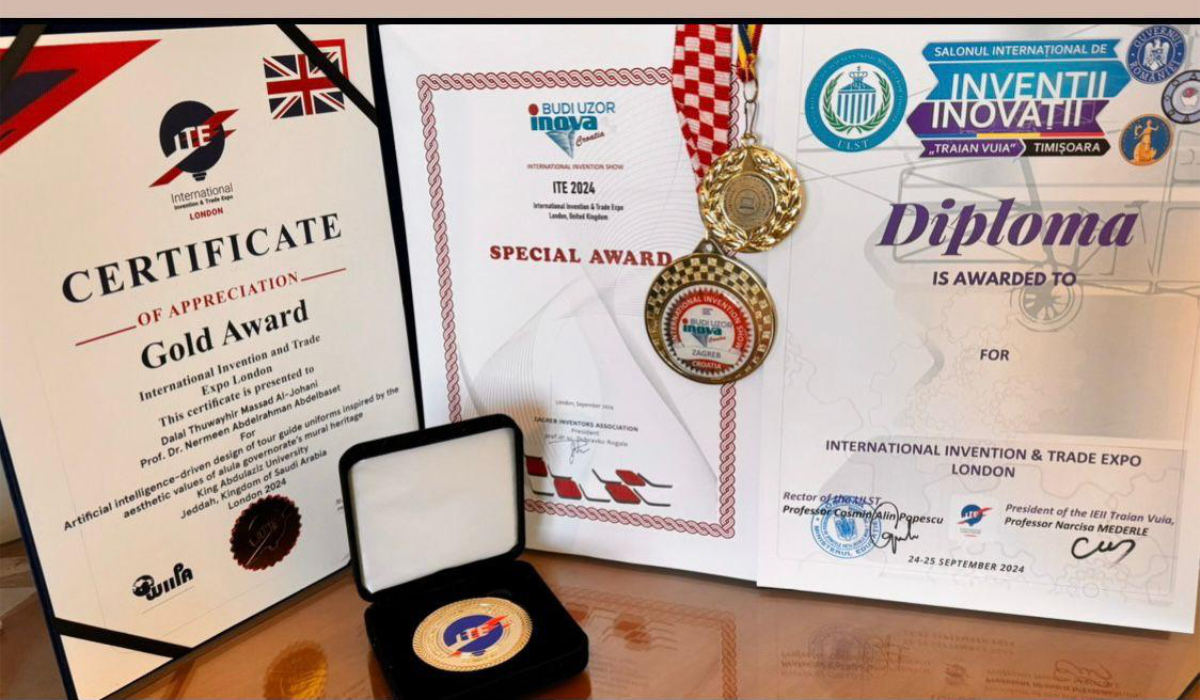
Functionality was a key consideration in the uniform’s design, and Al-Juhani added: “The uniform gives the tour guide a sense of belonging and comfort, leaving a positive impression on tourists, which elevates the level of professionalism in the tourism sector.”
As a young Saudi designer Al-Juhani’s message to her peers is to keep up with modern trends by utilizing new technologies in design and illustration. In fact, as part of her project, she harnessed artificial intelligence techniques to enhance her designs.
And to bring her vision to life she used AI-powered tools like Midjourney and Lexica to develop prototypes before transitioning to manual work.
She said: “I used natural leather and techniques such as burning and decoration that mimic the ancient Nabataean style. I also added traditional details using leather threads and blanket stitching to enhance the heritage touch.”
While Al-Juhani did face some challenges in sourcing high-quality materials, the input offered by tour guides made the process smoother.
She added: “I made sure to involve them in every stage to strengthen their connection to the uniform, making it a project they felt a part of rather than just a product.”
Her innovative approach has already earned her recognition, and Al-Juhani was awarded the gold medal at the London International Exhibition of Inventions and Innovations in 2024, as well as receiving special recognition from Croatia and Romania at the same event.
“It was proof that heritage and monuments give design authenticity, uniqueness, and enhance its aesthetic and expressive value,” she said.
Saudi traditional crafts on show at Jouf camel auction

- Women demonstrate art of making sameel storage pouches
RIYADH: The art of making leather containers for storing food and drinks was just one of the attractions at the recent Jouf camel auction in Dumat Al-Jandal governorate.
With 2025 designated as the Year of Handicrafts, festivals across Saudi Arabia are providing important platforms for artisans to showcase and market their traditional skills.
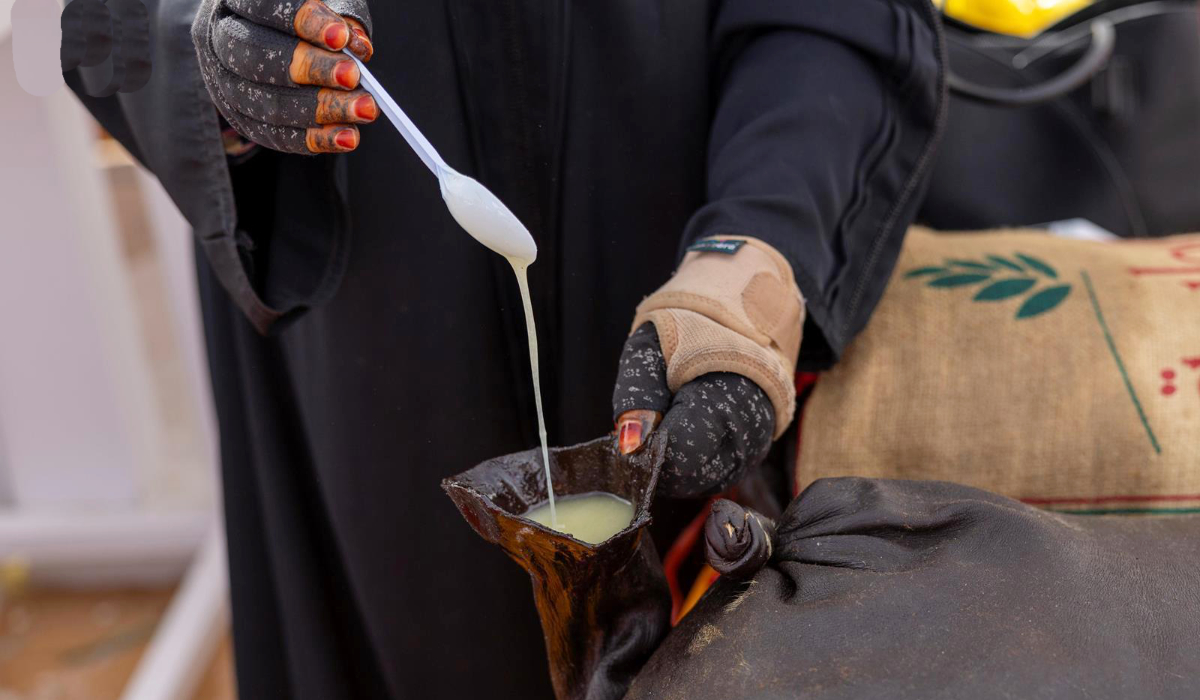
At the camel auction, which ends on Tuesday, craftswoman Umm Meshaal, told the Saudi Press Agency how she produced sameel, a type of pouch made from animal hide and used for storing ghee, yogurt and water.
Meshaal said that sheep skin worked best for keeping yogurt, while goat skin was better for ghee.
FASTFACTS
• At the Jouf camel auction, craftswoman Umm Meshaal told the Saudi Press Agency how she produced sameel.
• It is a traditional pouch made from animal hide and used for storing ghee, yogurt and water.
The process starts by tanning the skins using a tree extract and salt to remove the hair and any impurities. The hides are then left to dry before being cut and sewn together into the desired shape.
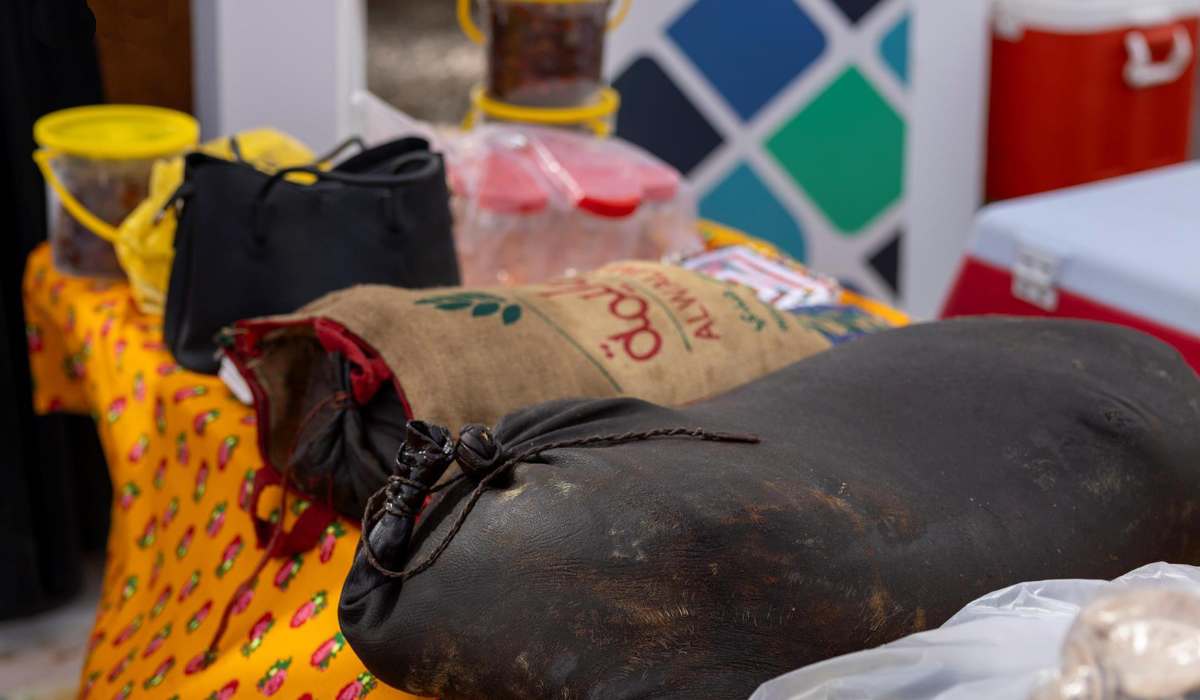
The ancient art of making sameel is still relevant in modern-day Jouf, particularly among Bedouin communities who use them for storing and carrying vital supplies.
Many consumers say the best ghee in the Kingdom comes from these traditional vessels, the report said.























